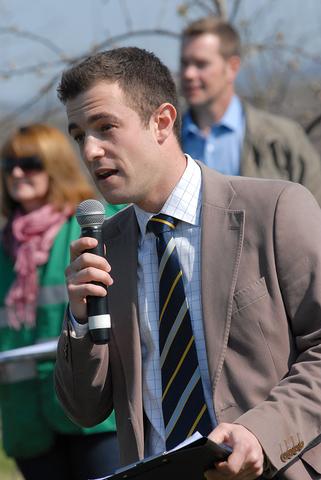Chris Muntz

Q&A
Five minutes with… Chris Muntz, growers development manager for cider producer, HP Bulmer Ltd
Why did you choose to study at Harper Adams?
I remember going around a couple of universities and liking the facilities at Harper Adams. The course content seemed very interesting and I enjoyed meeting the lecturers. Friends/family that had studied there gave good reviews of their experience.
What were the best things about the course?
The approachability and knowledge of the lecturers, and their willingness to go the extra mile, such as organising study tours. The range of the different modules available and also associating projects/assignments with real-life situations.
Did it make you more employable?
Yes, through my knowledge of agriculture and agricultural business, the contacts I made, and the placement year.
Tell us a little about any projects you worked on.
My dissertation involved selecting different game covers and testing them for herbicide selectivity. I did this in conjunction with Frontier Agriculture, who I worked for during my placement year - they had already done some work on this which I furthered. Frontier had an interest in this as they supplied and advised on many different types of game cover and any herbicides which could be used. My project helped with identifying how safe different herbicides were when used on different game cover crops.
What was the teaching at Harper Adams like?
Helpful, knowledgeable, always available and I am still in contact with some of them.
And the facilities?
Excellent – and always seem to be improving.
What are your favourite memories?
The friends I made, sport, the trips we went on.
Why would you recommend the university?
You can get as much out of it as you want to, and more – there seems to be something for everyone.
Where did you spend your placement year?
With Frontier Agriculture Ltd, where I was an agronomist assistant.
What did you enjoy most about it?
The varied nature of the company I worked for and the opportunity to see agriculture from another point of view. I really enjoyed my placement year and was delighted to go back to Frontier as a graduate. It is a great opportunity to try something different without any commitment. I would say if you find it isn’t something you want to do then it is equally, if not more, beneficial than finding that it is.
Frontier offered you a full-time job?
Yes, after graduating in 2009 I rejoined Frontier where I became a qualified agronomist.
Where do you work now?
In 2011 I joined Heineken’s cider-making business, HP Bulmer Ltd, as Growers Development Manager.
What does your job involve?
I work with circa 200 contract growers producing cider fruit off around 6500 acres of orchards, mainly in Herefordshire. I am also quite involved with the 2250 acres of our own farms, the farm managers, and the 40+ people we employ on them.
I am helping to secure Bulmer’s/Heineken’s requirement for cider apples, matching production to forecasts, with an emphasis on quality. We (as a department) are also responsible for scheduling the fruit into the mill at harvest time; this could be 100–120,000 tonnes (around 2000 tonnes a day) and is set to increase significantly over the next decade. I offer technical advice to our growers. This could be on pesticides, fertilisers, tree husbandry, etc. I am also responsible for any grower auditing we have to do. In addition, we, like many companies, are aware of the impact our activities can have on the environment we operate in. We have sustainability agendas, which our growers are very much a part of, and this will be a large part of my role going forward.
We host various events such as the Orchard and Machinery day every year – a bit like the cereals event of the cider world - and the Golden Apple Award, which is an orchard competition for growers. Through our nursery, producing traditional (large) standard trees, and advice, we support the heritage of the cider industry and the orchards that are synonymous with the area.
What do you enjoy most about the job?
I enjoy working with our contract growers and the relationships we have with them – contracts can be 25 years long and in many situations we have dealt with several generations of the same family. The people I work with are great – they are very committed and knowledgeable. I enjoy being part of a joined-up supply chain, seeing how the raw product we produce (the apples) affects the final product that is produced (the cider). The role is one I can take ownership of and make my own. Heineken is the third largest brewer in the world, so seeing how such a large company works is very interesting – it’s fast moving, there always seems something going on and I even got some tickets to the Heineken® Cup semi-final at Twickenham.
What skills/experience was your employer looking for?
As well as looking for someone with an agricultural and technical grounding they were also after a person who was willing to learn. Many employers appreciate that new people they bring in will not know everything, so they are looking for people who they can invest in for the future, who will fit in with the current team.
How did your qualification/ experiences at Harper Adams aid your career?
Harper Adams has a very good reputation in industry and I made many useful contacts there who I still speak to now. Many of the things I studied are very relevant to my role, even though, at the time, the only association I had with cider was in a glass!
What does the future hold?
Going forward there are likely to be constant challenges in producing enough cider fruit to meet demand in an environmentally friendly, socially acceptable and economic way. The cider industry has experienced a huge amount of growth over the past six years, and this is predicted to continue. Unlike beer and lager, which has declined in the UK, this has prompted the other big global brewers to launch their own cider brands. Heineken (and others) have some ambitious plans for cider, both in this country and abroad. The future looks bright and I hope to continue my career in the industry.
Any advice for other students?
Be willing to learn, make an effort to get along with people and show that you will be able fit into the workplace. It’s a small world and it’s amazing where, and how often, you meet people that you’ve worked or studied with in the past, especially if you went to Harper Adams.




